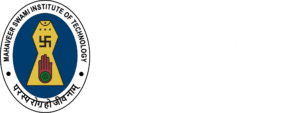About Mechanical deptt.
The Mechanical engineering of Mahavir Swami Institute of Technology MSIT is the discipline that applies engineering, physics, engineering mathematics, and materials science principles to design, analyze, manufacture, and maintain mechanical systems. It is one of the oldest and broadest of the engineering disciplines.
The mechanical engineering field requires an understanding of core areas including mechanics, dynamics, thermodynamics, materials science, structural analysis, and electricity. In addition to these core principles, mechanical engineers use tools such as computer-aided design (CAD), computer-aided manufacturing (CAM), and product life cycle management to design and analyze manufacturing plants, industrial equipment and machinery, heating and cooling systems, transport systems, aircraft, watercraft, robotics, medical devices, weapons, and others. It is the branch of engineering that involves the design, production, and operation of machinery.
Mechanical engineering emerged as a field during the Industrial Revolution in Europe in the 18th century; however, its development can
be traced back several thousand years around the world. In the 19th century, developments in physics led to the development of mechanical engineering science. The field has continually evolved to incorporate advancements; today mechanical engineers are pursuing developments in such areas as composites, mechatronics, and nanotechnology. It also overlaps with aerospace engineering, metallurgical engineering, civil engineering, electrical engineering, manufacturing engineering, chemical engineering, industrial engineering, and other engineering disciplines to varying amounts. Mechanical engineers may also work in the field of biomedical engineering, specifically with biomechanics, transport phenomena, bio mechatronics, bio nanotechnology, and modelling of biological systems.
MSIT Mechanical Engineering Program Educational Objectives
The educational objectives of the Mahavir Swami Institute of Technology MSIT Mechanical Engineering Program are to produce graduates who, within three years of graduation, are able to:
Be employed as a practicing engineer in fields such as design, research, development, testing, manufacturing, operations and
service systems;
Assume positions of leadership and responsibility within an organization; and progress through advanced degree or certificate programs in engineering, business, and other professionally related fields.
Direct assessment of Student work. Each year faculty members in the program assess graded examples of student work to determine the level of achievement. The examples of student work are linked directly the Student Outcomes.
MSIT Program Learning Outcomes
- an ability to apply knowledge of mathematics, science, and engineering
- an ability to design and conduct experiments, as well as to analyze and interpret data
- an ability to design a system, component, or process to meet desired needs within realistic constraints such as economic, environmental, social, political, ethical, health and safety, manufacturability, and sustainability
- an ability to function on multidisciplinary teams
- an ability to identify, formulate, and solve engineering problems
- an understanding of professional and ethical responsibility
- an ability to communicate effectively
- the broad education necessary to understand the impact of
engineering solutions in a global, economic, environmental, and
societal context - a recognition of the need for, and an ability to engage in life-long learning
- a knowledge of contemporary issues
- an ability to use the techniques, skills, and modern engineering tools necessary for engineering practice
- an ability to work professionally in both thermal and mechanical systems areas.
The Program Educational Objectives were established through the input from employers of MSIT students, alumni, and industrial constituents of the program. The achievement of Program Educational Objectives is assessed through the use of alumni and employer surveys, as well as employer focus groups. The Student Outcomes are assessed using a combination of the following instruments:
- Direct assessment of Student work. Each year faculty members in the program assess graded examples of student work to
determine the level of achievement. The examples of student work are linked directly the Student Outcomes. - Senior Exit Surveys. This assessment survey is completed by all graduating seniors in which they are asked to rate how well the Student Outcomes were achieved.
- Internship Employer Surveys. This assessment survey is completed by supervisors of students who receive internship credit. Employers are asked to rate how well the Student Outcomes were achieved.
- Senior Design Industrial Sponsor Surveys. This assessment survey is completed by supervisors of senior design projects to
measure how well the outcomes of the senior design experience were achieved.
Fundamentals of Engineering Exam reports from the National Council of Examiners for Engineering and Surveying. Thus, the nationally administered exam provides a national benchmark for assessing achievement of the Student Outcomes.

